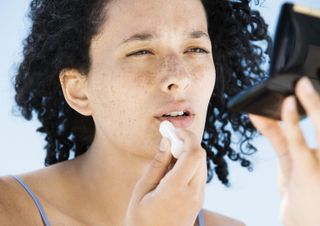
Can Lip Balm Make Your Chapped Lips Worse?

You need your lips to talk, take duck-face selfies and kiss your loved ones. That's why dry, chapped lips can not only be itchy and painful, they can sometimes be downright embarrassing. But repeatedly applying lip balms and products may not help your case.
Lip balms provide only temporary comfort, and some types can make scaly lips even drier.
That's because, in part, when the thin film of moisture from the lip balm evaporates, it dehydrates your lips even more. "It starts a vicious cycle," Dr. Leah Jacob, an assistant professor of dermatology at Tulane University, told Live Science. [Why Are Lips Red?]
Many of us have to deal with scaly lips, especially in the cold and dry winter, so doctors and beauty pros recommend we treat our lips, as well as the rest of our skin. "Any part of our body that is not covered in the wintertime is going to be subjected to the elements," said Dr. Crystal Aguh, an assistant professor of dermatology at Johns Hopkins University. "People tend to get very dry hands in the winter because we're wearing long-sleeved shirts and jackets, but we're not necessarily covering our hands."
Likewise, people rarely cover their faces and lips during the wintertime, and so those tend to dry out, too, Aguh told Live Science.
Although lips look very different from the rest of our skin, they’re actually quite similar, Aguh said. Just like the rest of our skin, the lips are made up of three layers of cells: the outermost layer of mostly dead cells, known as the stratum corneum, the epidermis and the dermis, which sits below it.The main difference is that these layers — especially the stratum corneum, which forms a protective barrier over the others — is much thinner in the lips and, therefore, more vulnerable to damage.
Additionally, lips don't have any hair follicles or oil glands of their own. Instead, the oil from glands around our lips provide moisture. Licking your lips or applying a thin gloss, balm or anything out of a tube to supplement that moisture may sound like a good idea, but it can be the worst thing you do for them because it can lead to further dehydration, Jacob said.
Sign up for the Live Science daily newsletter now
Get the world’s most fascinating discoveries delivered straight to your inbox.
Some lip balms contain ingredients that can be irritating or drying. Menthol, salicylic acid, cinnamic aldehyde and peppermint flavors are all culprits, Jacob said. "A lot of people don't have any problems with these ingredients, but people with sensitive skin or allergies may be more sensitive to these on their lips, as well," she said.
Shiny glosses and oils are also thought to intensify damage from the sun's ultraviolet (UV) rays, focusing the rays the way a magnifying glass may channel a beam of light onto your lips. But because lips have less melanin — the pigment that gives skin its color — the skin cells in your lips are more likely to sustain sun damage if you use shiny lip products, Jacob said.
Jacob recommends using a thick, emollient lip balm or ointment with SPF in it to truly protect your lips. Glycerin or plain old petroleum jelly are good ingredients to look for, she noted. You can also try using a humidifier at home, which will replenish moisture in the air and, eventually, in your lips. And drink more water to stay hydrated from the inside out.
Original article on Live Science.
Most Popular



